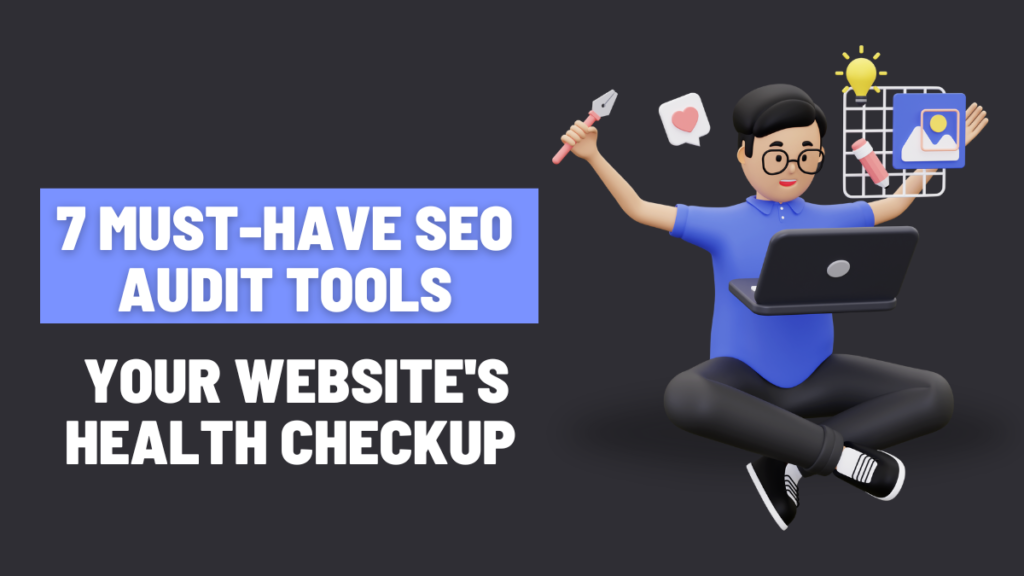Think of your website like your car. Regular maintenance is necessary. An SEO audit is like a tune-up that uncovers hidden issues that may be slowing you down in search engine results. And who doesn’t want to be on the top of Google, right?
The best part is that you don’t need to be an SEO wizard to do this! There are wonderful tools (some even free) that can do the heavy lifting for you. Let’s dive deeper into this and get your website in tip top shape!
Why You Need an SEO Audit
Imagine…you’ve spent hours creating amazing content for your blog. But, for some reason, no one is finding it on Google. Frustrating! 😖It’s like shouting into the void.
Here is where an SEO audit saves the day:
- Uncover hidden problems: Things like broken links, slow loading speeds, or missing image descriptions – all of which can hurt your rankings.
- Track your progress: How do you know if the changes you’re making are actually working? SEO audits give you data to see what is improving.
- Beat the competition: Your competitors are probably doing this too. Don’t be left behind in the dust!

Supercharge Your Website: Must-Have SEO Audit Tools
Now let’s cut to the chase: the tools you need. I’ve chosen a mix of free and paid options to meet different budgets and needs.
1. SEOptimer (Free and Paid Plans)
- What it checks: Technical aspects (website code, structure), content quality and some basic keyword analysis.
- Why it works: Super easy to use, with a neat report that highlights what you should fix first.
- Best for: Beginners or anyone needing a quick checkup.
- Low KD, Low Traffic Keyword: “Free SEO Audit”
2. Google Search Console (Free)
- What It Checks: Google’s own view of your site! See how many pages are indexed, any errors, and keywords you rank for.
- Why It Rocks: It’s like getting an inside scoop straight from the source.
- Best For: Everyone! No matter your website size, this data is gold.
- Low KD, Low Traffic Keyword: “google search console tutorial”
3. Screaming Frog (Free + Paid)
- What It Checks: Technical SEO galore. It crawls your site like Google, finding everything from broken links to duplicate content.
- Why It Rocks: The free version is still powerful, especially for smaller websites.
- Best for: Those comfortable with a slightly more technical tool.
- Low KD, Low Traffic Keyword: “screaming frog tutorial”
4. Ahrefs (Paid)
- What It Checks: The ultimate SEO powerhouse. Technical analysis, keyword research, plus it spies on your competitors!
- Why It Rocks: If you’re serious about SEO, this is an investment worth considering.
- Best For: Businesses or those looking to supercharge their SEO game.
- Low KD, Low Traffic Keyword: “ahrefs site audit tutorial”
5. Semrush (Paid)
- What It Checks: Similar to Ahrefs – a full SEO suite packed with features for analysis and improving your rankings.
- Why It Rocks: A huge competitor to Ahrefs. Frequently, preference has a role in the decision.
- Best For: Those willing to pay for powerful SEO insights.
- Low KD, Low Traffic Keyword: “semrush seo analysis”
Additional (and Awesome) Freebies
- Google PageSpeed Insights: How fast does your site load? It matters! This tells you.
- GTmetrix: Another speed checker, offering more detailed fixes.
- AlsoAsked: Find out what questions people are really asking about your topic.
Understanding Your SEO Audit Report
Okay, you ran the tool… now what? Don’t panic! Most tools categorize issues:
- Errors (Red Flags): Fix these first. Think broken links that frustrate visitors.
- Warnings (Yellow Lights): Important, but might not be critical to rankings.
- Notices (Green Light): Good practices to follow.
Don’t get overwhelmed by a huge list! Focus on fixing the biggest issues, then the rest will get easier.
How to Act on Your Audit Results
So, you have a fancy report outlining potential website woes. Great, but would you take a car with a busted engine to the car wash? Let’s prioritize fixes!
1. Tackle The Critical Stuff
- Broken Links: Imagine clicking on something and landing on a 404 “Page Not Found” error. Bummer! Good SEO tools show you where these are, so you can fix or redirect them. Your visitors (and Google) will thank you!
- Massive Images: Beautiful visuals are awesome, but if they take forever to load, people bounce. Optimize image sizes without sacrificing quality. Free tools like TinyPNG help.
- Missing Metadata: Think of this as labeling folders neatly. Title tags and meta descriptions are the snippets that show on Google – make them enticing and keyword-rich!
2. The Nitty-Gritty Technical Bits
- Confusing Website Structure: A clean sitemap and easy navigation help search engines understand your content – like a good map helps a traveler find their way.
- Duplicate Content: Having the same content on multiple pages confuses Google. Every page should have significant, original content.
- Mobile Friendliness: More people browse on phones than on computers! If your site looks wonky on smaller screens, that’s a red flag. Many site builders have mobile-responsive themes to ease this.
3. Content is (Still) King
- Thin Content: Blog posts with only a few paragraphs won’t cut it. Aim for quality over quantity, giving readers real value.
- Keyword Stuffing: Cramming in keywords unnaturally used to work, now it gets you penalized by Google. Write naturally!
- Outdated Information: Is that article from 2015 still accurate? Fresh content signals to Google your site is alive and well.
Important Note: Don’t try to fix everything at once! Pick a few high-impact items, track changes, then tackle the next batch.
Beyond the Tool: SEO as a Habit
An SEO audit isn’t a one-time thing. Here’s how to make it work for you long-term:
- Regular Check-Ups: Schedule audits quarterly or at least twice a year. Websites, like cars, need tune-ups.
- New Content = New Audit: Every time you publish something big, give it a quick audit before hitting publish.
- Competitor Sneak Peek: See what those ranking above you are doing! A quick audit of their site can give you ideas.
Frequently Asked Questions (FAQs)
- Are fancy paid tools really better than free ones? Paid tools offer more data and automation. If you have a large, complex site or rely on SEO heavily, it’s worth it. But free tools are excellent for starters!
- Can’t I just hire an SEO expert? You could, but having a basic understanding yourself ensures you can ask smart questions and know if they’re doing a good job.
- How long until I see results from my SEO fixes? It’s not overnight magic. Google takes time to re-crawl your site and factor in changes. Be patient and consistent for the best long-term wins.
- What are ‘black hat’ SEO tactics I should avoid? Stay away from anything that promises super-fast results, like buying links or tricking Google with hidden text. It’ll backfire eventually!
- I’m overwhelmed! Where can I learn more about SEO? Tons of great resources exist. Check out Moz’s Beginner’s Guide to SEO or blogs like Backlinko for deeper dives into specific topics.
Summary
Think of an SEO audit as a health check on your website. By uncovering hidden issues and using the right tools, you unlock your site’s true potential to shine in those search results.
To decide! Try one of the free tools mentioned today and see what potential improvements emerge for your website. Share your findings in the comments below! Let’s help each other improve our online presence one audit at a time.



